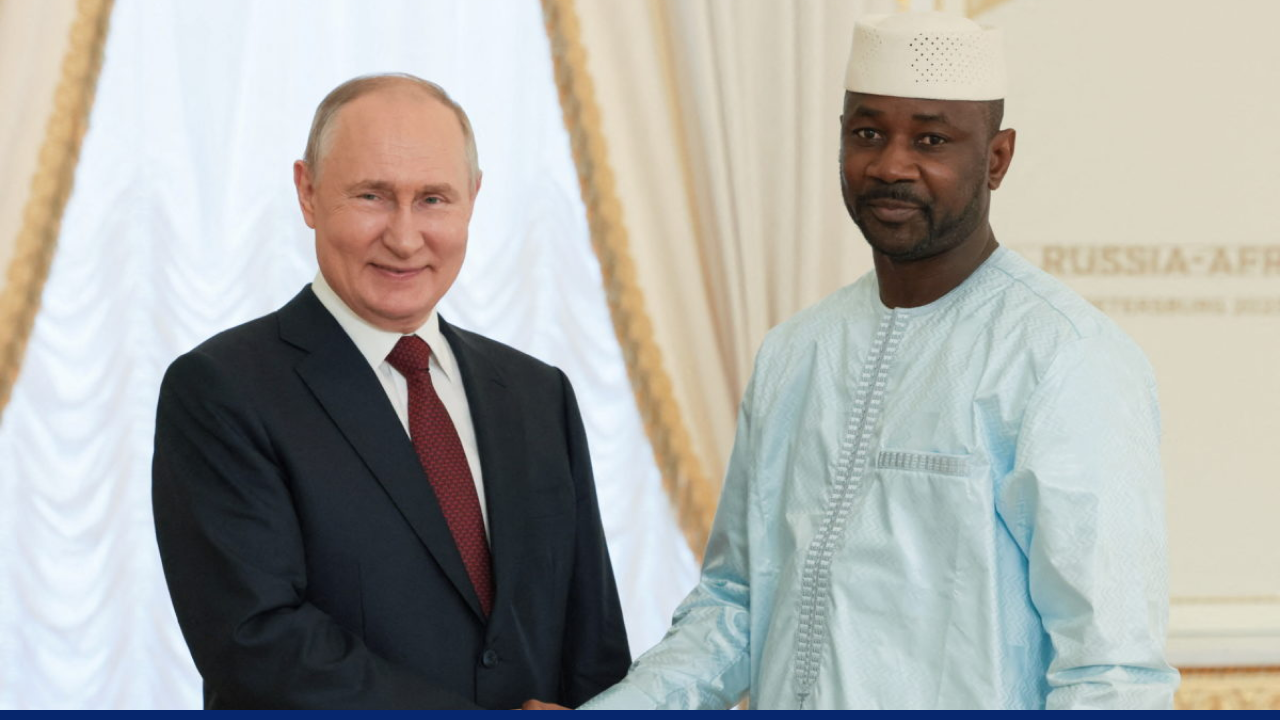26 Jun 2025
11 MIN READ
The Real Scope of Russian Influence in Africa: Strategy, Stakes, and Global Implications
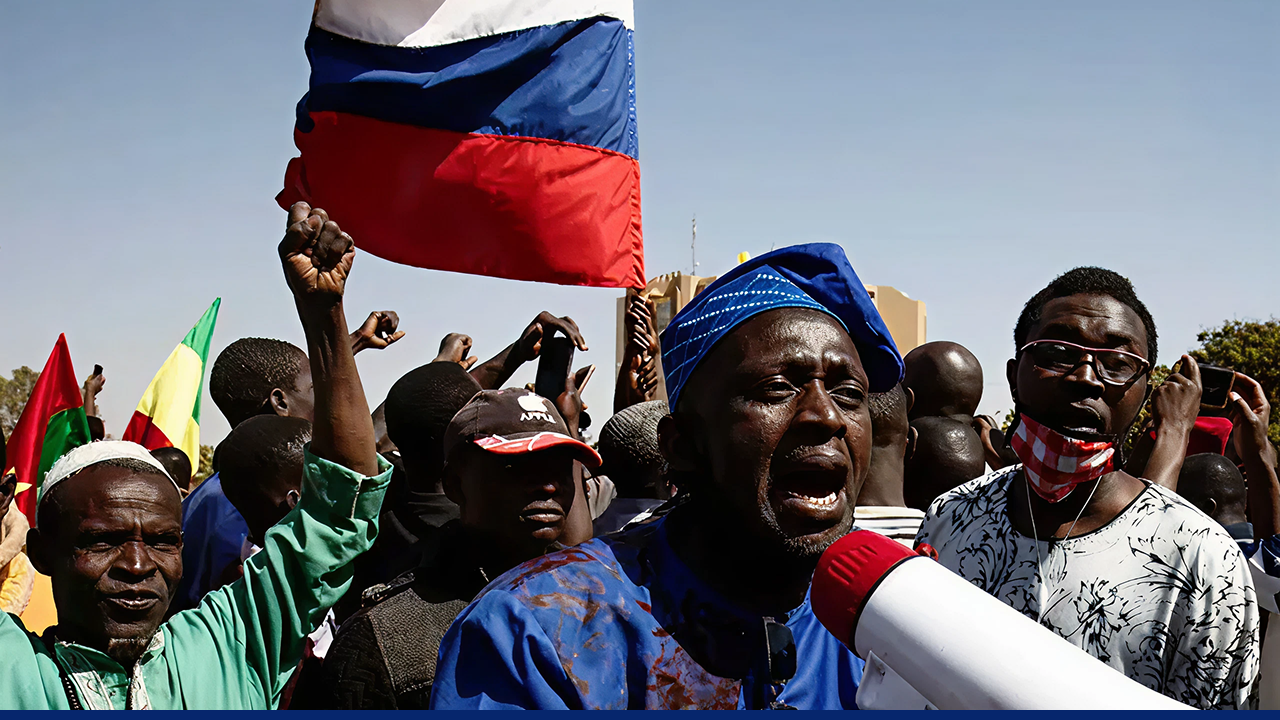
Russia was able to gather all 54 African states at Sochi in the first-ever Russo-African 2019 summit to promote bilateral and multilateral ties. Credits: Observer Research Foundation
Summary
The 21st century has sparked a new race for influence in Africa. This is called the "New Scramble for Africa." Unlike the land grabs of the 19th century, today's contest involves military partnerships, resource extraction, political alliances, and economic dependence.
At the same time, most of the focus remains on China and the US, due to their different methods of wooing African nations. One key player is overlooked, and it is Russia. It is building ties with important African nations through security deals, private military contracts, disinformation efforts, and trade partnerships. This rising influence challenges Western power and changes Africa's global alliances.
Growing Russian Influence in Africa
Russia is growing its presence in Africa. This goes beyond military actions or striking headlines. It’s a careful strategy to boost global influence. The media often focuses on Wagner Group activities or arms sales. However, Moscow's true aim includes diplomacy, economic investments, and soft power.
In countries such as Mali, Sudan, the Central African Republic, and Burkina Faso, Russia seeks to serve as an alternative to Western influence. They can capitalize on the area's poor history with European powers, particularly with France. This approach attracts leaders who seek to maintain power, preserve sovereignty, or evade Western pressure.
History: Scramble for Africa
The relationship between Africa and Russia developed long before the massive decolonization of Africa in the 1960s. Throughout most of the 18th and 19th centuries, it was no secret that the USSR had been a staunch supporter of decolonization worldwide and national liberation movements. So, they focused on their immediate neighbours.
In 1885, an adventurer named Nikolai Ashinov was credited with bringing Africa to the attention of the Russian elite. Although their attempt to colonise the Red Sea failed, Russia’s desire to expand its empire did not fade.
In 1897, the Russian Foreign Ministry sent its first diplomatic mission, laying the foundation for Russia’s relations with Africa. However, when the Russian imperialists engaged with Africans, they didn't treat them equally but as racially inferior people.
Timeline of relations of the Soviet Union and Russia with African countries
-
Late 18th Century: Russia first reaches out to Morocco, Egypt, and Tunisia, seeking alliances against the Ottoman Empire.
-
1869-1898: Russia establishes formal diplomatic relations with Tunisia, Morocco, Ethiopia, and the South African Republic (also known as the Transvaal).
-
1917: The Russian Revolution and the formation of the Soviet Union disrupted diplomatic ties with Africa.
-
1943: The Soviet Union resumes diplomatic relations, starting with Egypt and Ethiopia.
-
Post-1945 (Post-WWII): USSR actively supports African decolonization and national liberation movements.
-
1950s–1970s: The USSR builds strong ties with North African countries, including Egypt, Libya, Algeria, Morocco, and Tunisia.
-
1960s–1980s: The USSR strengthens its ties with socialist-oriented countries in Sub-Saharan Africa, including Angola, Mozambique, Ethiopia, and Guinea.
-
1970s–1980s: Major infrastructure projects were undertaken, Including Dams, steel plants, and refineries in Egypt, Nigeria, Angola, Guinea, and other countries.
-
1970s–1980s: Significant military assistance is provided to Egypt, Angola, and Mozambique.
-
USSR becomes dominant arms supplier:
-
40% of Africa’s arms imports
-
Tanks: 70%, Aircraft: 40%, Helicopters: 35%
-
-
1991: The dissolution of the Soviet Union disrupts ongoing relations and assistance.
-
2019: The Russia–Africa Summit, held in Sochi, aims to revitalize modern diplomatic and economic relations between Russia and Africa.
-
2023: The Second Russia–Africa Summit in St. Petersburg reaffirmed the importance of long-term cooperation.
Russian Influence in Africa map
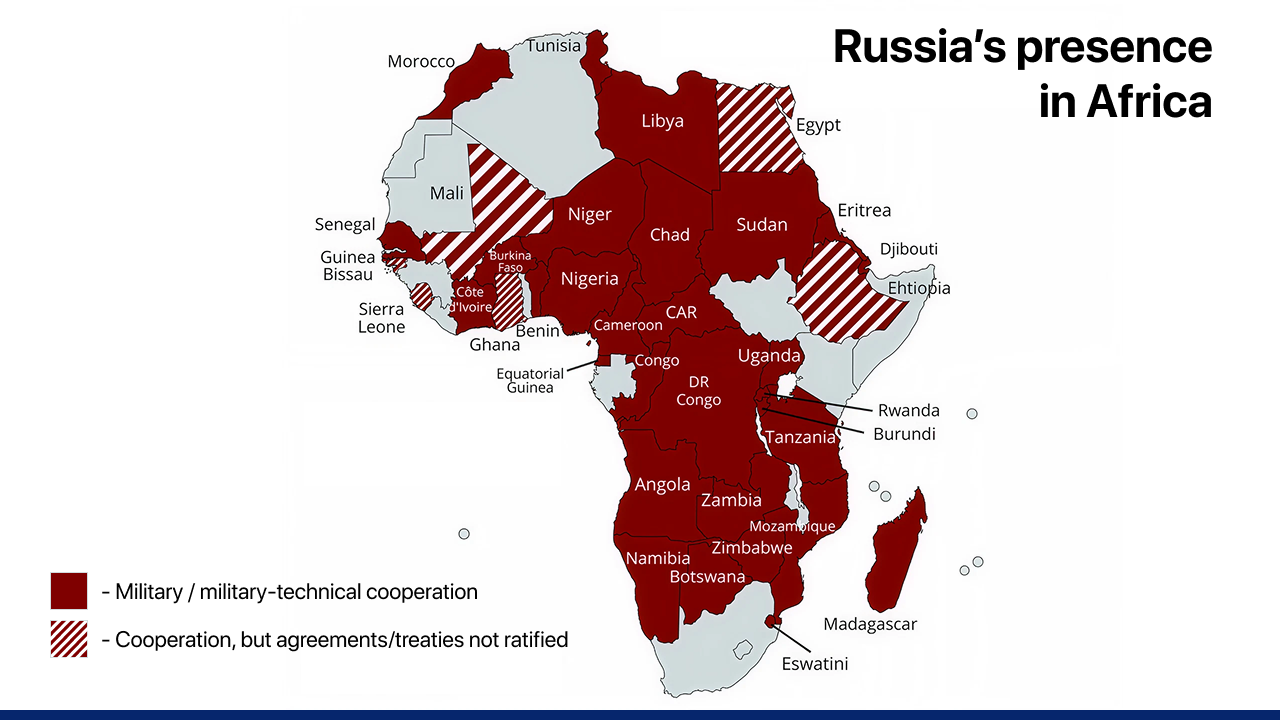
Russia's military and strategic presence across Africa highlights countries with formal defense cooperation and pending agreements. Credits: Institute of New Europe
Key African nations supported by Russia
-
Central African Republic (CAR): The country receives security support from the Wagner group or the newly formed Africa Corp. Russia has gold mining interests in the CAR.
-
Mali: It is a Sahel nation with Russian military backing following France's exit. The Africa Corp provides training and arms to the country.
-
Sudan: It is rumored to have Wagner activity in this region. Sudan has several players, such as the UAE and Egypt, involved due to the trade.
-
Libya: It receives Russian support for factions in the civil war. What Russia gets in return is to use its military presence. This will become more relevant and useful now that it has lost its base in Syria following the fall of the Assad regime.
-
Burkina Faso: It is shifting its alliances from France to Russia. Russia can capitalize on the rising tide.
-
South Africa: It is a BRICS ally. They offer political solidarity and vote in alignment with Russia in the UN on many issues. They also do naval drills with Russia.
The Role of the Wagner Group and Military Power Projection
When Russia started increasing its military influence across Africa, it often came at the expense of traditional Western powers. Russia expanded its military footprint by signing military cooperation agreements with 43 African countries, according to the European Parliament. They also provide military training and supply equipment. Russia offers governments a "regime survival package" in exchange for access to vital resources.
Yevgeny Prigozhin was a Russian oligarch, once close to Putin and dubbed his "personal chef." He founded the Wagner Group, a private mercenary force active globally. Prigozhin gained prominence in Ukraine's war, later led a failed mutiny against Russia’s military leadership, and died in a mysterious plane crash in 2023.
Following the collapse of the Wagner Group after Yevgeny Prigozhin’s death, Russia’s military intelligence has taken control of these operations, aiming to secure mining concessions in resource-rich countries like Mali and Niger.
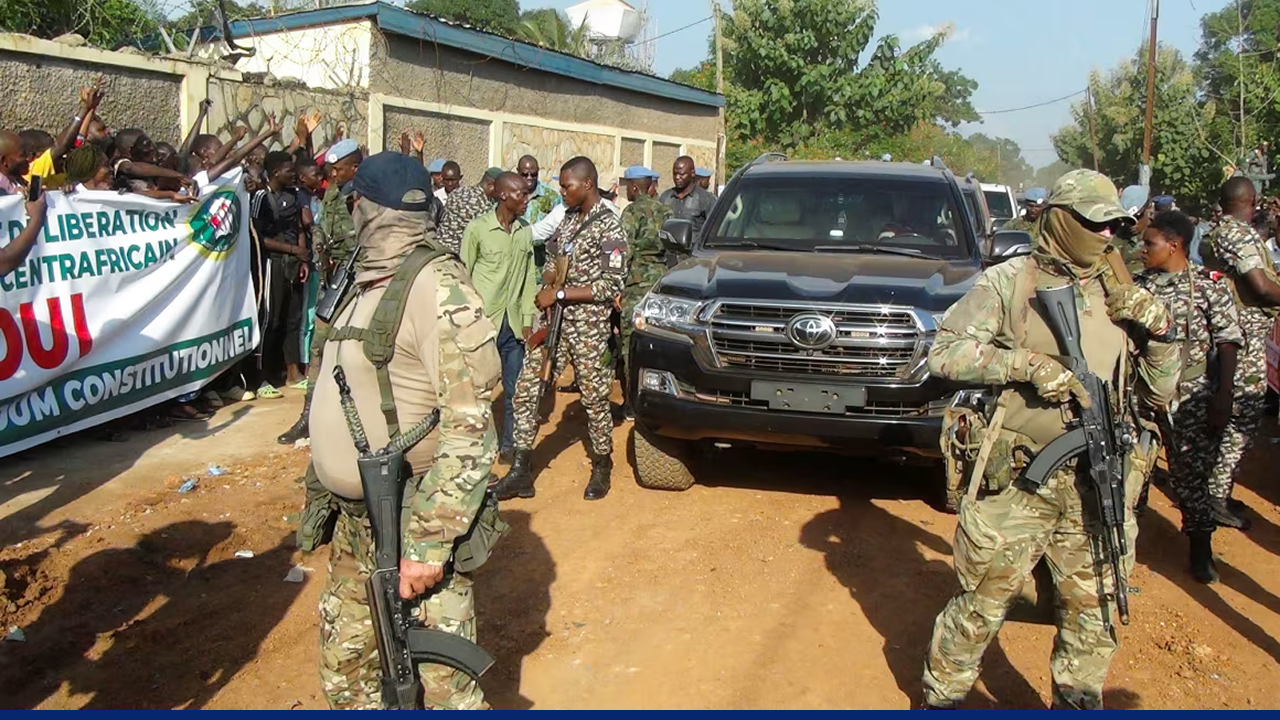
Russian officers from the Wagner group, who are part of the presidential security system, surround Central African Republic President Faustin-Archange Touadéra in Bangui. Credits: Leger Kokpakpa/Reuters
Security-for-resources trade: What Wagner offers in exchange
Wagner has rebranded itself as “Russia’s Expeditionary Corps" or simply “Africa Corps.” They provide African governments a key "security-for-resources" deal. In return for protecting their regimes and fighting insurgents, Russia secures valuable resources like gold, uranium, and lithium.
This plan seeks to reduce Western control over these assets, boosting Russia’s economic and political power. These actions also strengthen Moscow's presence in mineral-rich areas. Countries such as Mali and Niger are increasingly relying on Russian mercenaries for their security.
Human rights concerns and impact on sovereignty in Africa
The Wagner Group, also known as “Africa Corp,” has a significant presence in Africa, raising concerns about human rights and sovereignty issues. In the Central African Republic, Mali, and Sudan, reports link these groups to extrajudicial killings, disappearances, and torture. Civilians often experience random violence. Human Rights Watch and the UN point to alleged war crimes by Wagner, especially in conflict zones and mining areas.
Russia’s influence undermines national sovereignty. Countries that hire the group often give it wide control. This includes security sectors, key infrastructure, and natural resources like gold and diamonds. In some cases, Wagner has more power than local forces, which raises questions about governance and control.
By inserting itself in fragile states, they do more than protect regimes; they alter them. The presence of these mercenaries can deter political reform, support authoritarianism, and deepen reliance on Russian military aid and perpetrate a form of colonialism and dependence.
Russian President Vladimir Putin shakes hands with Mali's President Assimi Goita during a meeting following the Russia-Africa summit in Saint Petersburg. Credits: Mikhail Metzel/TASS Host Photo Agency via REUTERS
Strategic value of Africa: UN votes, natural resources, and global perception
Africa comprises 54 members of the UN. This means their votes are a valuable asset for Russia. They can help counter Western views or decisions made by the UN General Assembly. Economically, Africa has vast reserves of oil, gas, gold, and uranium. These resources are crucial for Moscow’s deals.
Culturally, Russia connects with post-colonial feelings. It presents itself as a partner instead of a colonizer. Russia is making its presence felt across Africa, employing a combination of military, diplomatic, and economic approaches.
Russia vs the West: The Geopolitical Tug-of-War
Russia is increasing its presence in Africa to counter the West's influence. Moscow claims to defend sovereignty and promote non-interference. It aims to challenge the Western liberal order, especially in regions still feeling the effects of colonialism.
This effort extends beyond military bases and mining rights. It seeks to shape beliefs, alliances, and the future of global order. Africa's strategic importance and changing politics make it a key battleground
How Moscow positions itself as an anti-colonial alternative to the West
Russia highlights its past support for African liberation movements. This sets it apart from Western colonial histories. Russian officials frequently discuss partnerships founded on “mutual respect” and “non-intervention.”
This creates a clear divide between Russia's approach and that of Western powers, which focuses more on "values." This stance appeals to African leaders and citizens wary of neocolonial actions, IMF conditions, and Western moralizing.
Impact of the Ukraine War on Africa-Russia Relations
Grain crisis and Moscow’s diplomacy
Before the war, over half of the wheat imports in 15 African countries came from both Russia and Ukraine. The conflict disrupted exports, which in turn brought a grain shortage and caused prices to skyrocket across Africa. Moscow took advantage of this crisis, offering free grain and blaming Western sanctions for the shortages.
Mistreatment of African students
Russia took advantage of Ukraine's mistreatment and discrimination at the start of the invasion. When Russia invaded, Black students and refugees faced racist policies at the borders, with white Ukrainians given priority for evacuation. Many African students, studying medicine and engineering, were left stranded or mistreated. Neither Ukraine nor the EU did much to protect them, and no one was held accountable for their actions.
There were numerous systemic biases. Many Africans learned about this and were already alienated by Ukraine, so they had no issues accepting Russian help in their countries. Despite that, Africans in Russia are also not always treated well. There are multiple stories of institutional and casual racism reported by Africans residing in Russia.
Sanctions loopholes via African ports and middlemen
Western sanctions cut Russia off from its usual markets. As a result, some African ports, particularly those with lax customs regulations, became key routes for circumventing these restrictions. Using unclear shipping routes, reflagged ships, and middlemen, Russian goods, including oil and minerals, found new pathways into global markets.
Some African nations, trying to remain neutral, supported this trade flow. This helped lessen the impact of sanctions and strengthened their economic ties with Moscow.
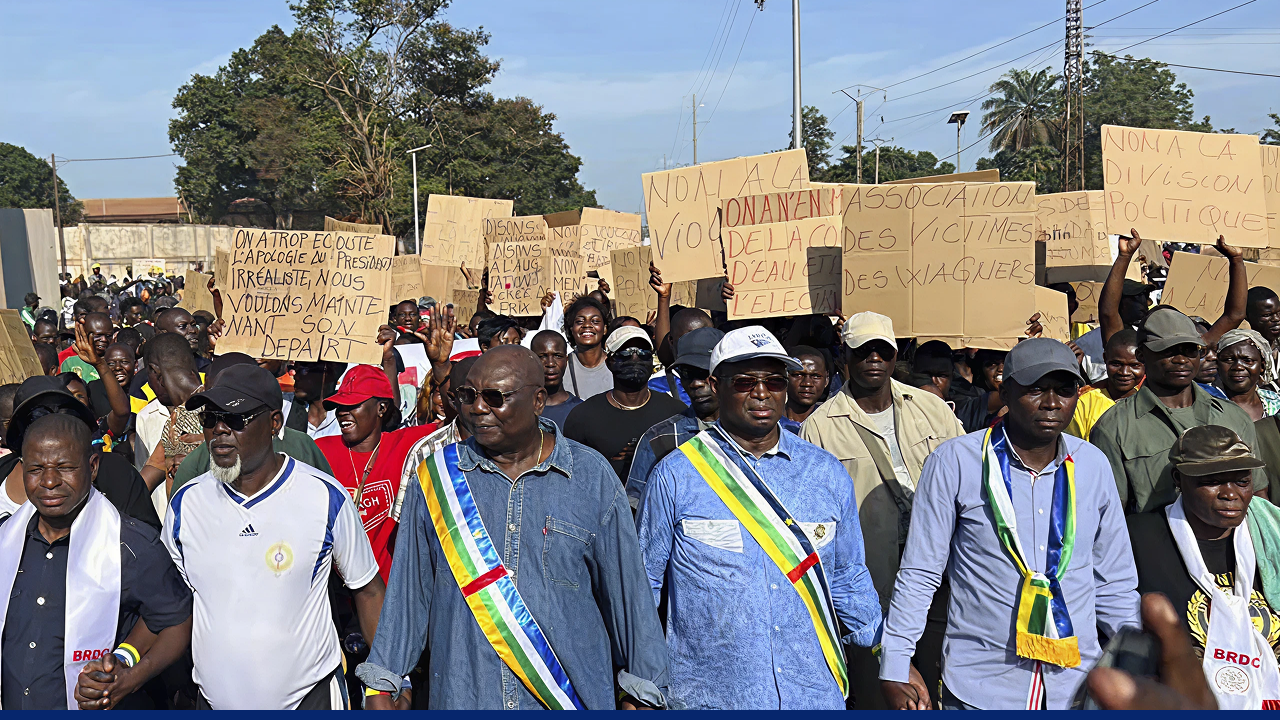
Opposition parties in the Central African Republic demonstrate in the streets of Bangui to protest the government and its use of Wagner mercenaries. Credits: AP Photo/ Jean Fernand Koena
Conclusion: A New Scramble for Africa?
Russia's growing role in Africa is a global concern. It signals a strategic shift with far-reaching effects. By offering military support, forming diplomatic ties, and sealing resource deals, Moscow is reshaping alliances. These connections often ignore Western views on democracy and human rights. This gives authoritarian regimes an alternative partnership model.
Russia’s position in Africa challenges the West's traditional dominance in the region. It disrupts multilateral efforts, such as UN peacekeeping, and deepens global divides that the Ukraine War has heightened. But Africa, once seen as a battleground for powers, is now asserting its voice.
People Also Ask
What countries are influenced by Russia?
There are many countries in Africa that Russia influences to some degree. However, the ones that Russia most significantly influences are: the Central African Republic, Mali, Sudan, and Burkina Faso.
Which African country did Russia colonize?
None, there was an attempt in 1889 in what is now Djibouti, but it was unsuccessful, as the French defeated them. Russia’s colonies were mainly located in its “near abroad” rather than overseas.
Which countries have invested the most in Africa?
China is the biggest investor. The other top investors are France, the US, the UAE, and the UK.
What are Russia's exports to Africa?
Mostly agricultural products, particularly grain (wheat, barley, and corn), and energy resources like oil and petroleum products. It also exports military equipment.

